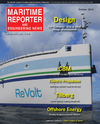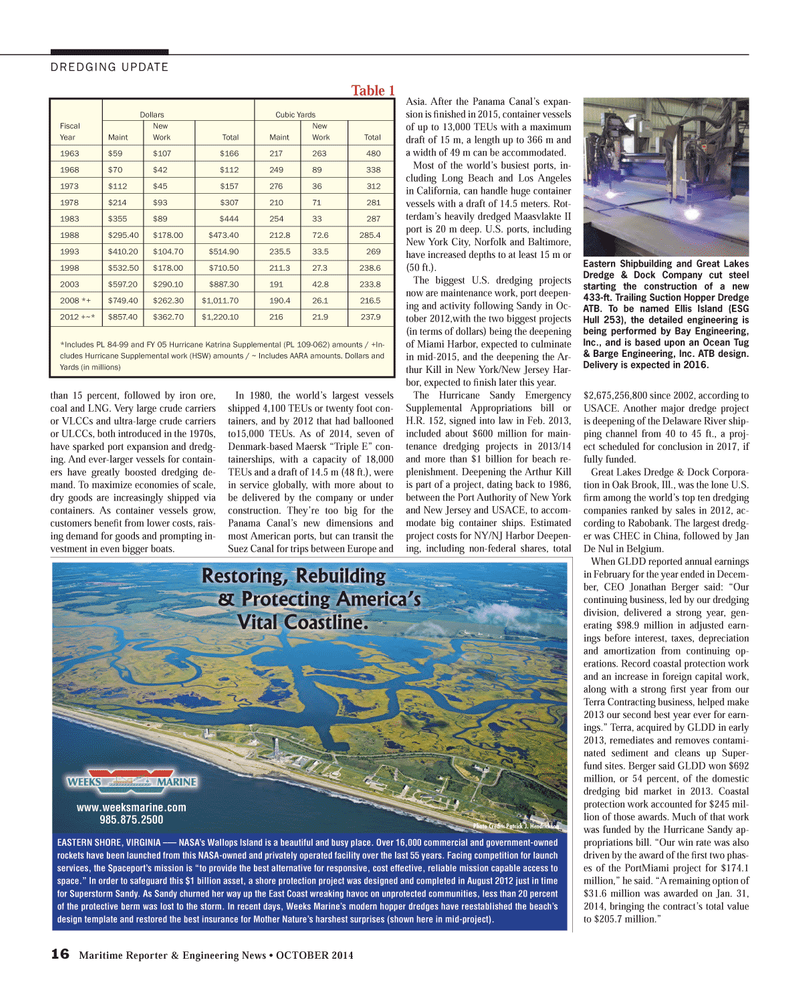
Page 16: of Maritime Reporter Magazine (October 2014)
Marine Design Edition
Read this page in Pdf, Flash or Html5 edition of October 2014 Maritime Reporter Magazine
16 Maritime Reporter & Engineering News • OCTOBER 2014
DREDGING UPDATE than 15 percent, followed by iron ore, coal and LNG. Very large crude carriers or VLCCs and ultra-large crude carriers or ULCCs, both introduced in the 1970s, have sparked port expansion and dredg- ing. And ever-larger vessels for contain- ers have greatly boosted dredging de- mand. To maximize economies of scale, dry goods are increasingly shipped via containers. As container vessels grow, customers benefi t from lower costs, rais- ing demand for goods and prompting in- vestment in even bigger boats.
In 1980, the world’s largest vessels shipped 4,100 TEUs or twenty foot con- tainers, and by 2012 that had ballooned to15,000 TEUs. As of 2014, seven of
Denmark-based Maersk “Triple E” con- tainerships, with a capacity of 18,000
TEUs and a draft of 14.5 m (48 ft.), were in service globally, with more about to be delivered by the company or under construction. They’re too big for the
Panama Canal’s new dimensions and most American ports, but can transit the
Suez Canal for trips between Europe and
Asia. After the Panama Canal’s expan- sion is fi nished in 2015, container vessels of up to 13,000 TEUs with a maximum draft of 15 m, a length up to 366 m and a width of 49 m can be accommodated.
Most of the world’s busiest ports, in- cluding Long Beach and Los Angeles in California, can handle huge container vessels with a draft of 14.5 meters. Rot- terdam’s heavily dredged Maasvlakte II port is 20 m deep. U.S. ports, including
New York City, Norfolk and Baltimore, have increased depths to at least 15 m or (50 ft.).
The biggest U.S. dredging projects now are maintenance work, port deepen- ing and activity following Sandy in Oc- tober 2012,with the two biggest projects (in terms of dollars) being the deepening of Miami Harbor, expected to culminate in mid-2015, and the deepening the Ar- thur Kill in New York/New Jersey Har- bor, expected to fi nish later this year.
The Hurricane Sandy Emergency
Supplemental Appropriations bill or
H.R. 152, signed into law in Feb. 2013, included about $600 million for main- tenance dredging projects in 2013/14 and more than $1 billion for beach re- plenishment. Deepening the Arthur Kill is part of a project, dating back to 1986, between the Port Authority of New York and New Jersey and USACE, to accom- modate big container ships. Estimated project costs for NY/NJ Harbor Deepen- ing, including non-federal shares, total $2,675,256,800 since 2002, according to
USACE. Another major dredge project is deepening of the Delaware River ship- ping channel from 40 to 45 ft., a proj- ect scheduled for conclusion in 2017, if fully funded.
Great Lakes Dredge & Dock Corpora- tion in Oak Brook, Ill., was the lone U.S. fi rm among the world’s top ten dredging companies ranked by sales in 2012, ac- cording to Rabobank. The largest dredg- er was CHEC in China, followed by Jan
De Nul in Belgium.
When GLDD reported annual earnings in February for the year ended in Decem- ber, CEO Jonathan Berger said: “Our continuing business, led by our dredging division, delivered a strong year, gen- erating $98.9 million in adjusted earn- ings before interest, taxes, depreciation and amortization from continuing op- erations. Record coastal protection work and an increase in foreign capital work, along with a strong fi rst year from our
Terra Contracting business, helped make 2013 our second best year ever for earn- ings.” Terra, acquired by GLDD in early 2013, remediates and removes contami- nated sediment and cleans up Super- fund sites. Berger said GLDD won $692 million, or 54 percent, of the domestic dredging bid market in 2013. Coastal protection work accounted for $245 mil- lion of those awards. Much of that work was funded by the Hurricane Sandy ap- propriations bill. “Our win rate was also driven by the award of the fi rst two phas- es of the PortMiami project for $174.1 million,” he said. “A remaining option of $31.6 million was awarded on Jan. 31, 2014, bringing the contract’s total value to $205.7 million.” Dollars Cubic Yards
Fiscal New New
Year Maint Work Total Maint Work Total 1963 $59 $107 $166 217 263 480 1968 $70 $42 $112 249 89 338 1973 $112 $45 $157 276 36 312 1978 $214 $93 $307 210 71 281 1983 $355 $89 $444 254 33 287 1988 $295.40 $178.00 $473.40 212.8 72.6 285.4 1993 $410.20 $104.70 $514.90 235.5 33.5 269 1998 $532.50 $178.00 $710.50 211.3 27.3 238.6 2003 $597.20 $290.10 $887.30 191 42.8 233.8 2008 *+ $749.40 $262.30 $1,011.70 190.4 26.1 216.5 2012 +~* $857.40 $362.70 $1,220.10 216 21.9 237.9 *Includes PL 84-99 and FY 05 Hurricane Katrina Supplemental (PL 109-062) amounts / +In- cludes Hurricane Supplemental work (HSW) amounts / ~ Includes AARA amounts. Dollars and
Yards (in millions) www.weeksmarine.com 985.875.2500
EASTERN SHORE, VIRGINIA ––– NASA’s Wallops Island is a beautiful and busy place. Over 16,000 commercial and government-owned rockets have been launched from this NASA-owned and privately operated facility over the last 55 years. Facing competition for launch services, the Spaceport’s mission is “to provide the best alternative for responsive, cost effective, reliable mission capable access to space.” In order to safeguard this $1 billion asset, a shore protection project was designed and completed in August 2012 just in time for Superstorm Sandy. As Sandy churned her way up the East Coast wreaking havoc on unprotected communities, less than 20 percent of the protective berm was lost to the storm. In recent days, Weeks Marine’s modern hopper dredges have reestablished the beach’s design template and restored the best insurance for Mother Nature’s harshest surprises (shown here in mid-project).
Restoring, Rebuilding & Protecting America’s Vital Coastline.
Photo Credit: Patrick J. Hendrickson
Table 1
Eastern Shipbuilding and Great Lakes
Dredge & Dock Company cut steel starting the construction of a new 433-ft. Trailing Suction Hopper Dredge
ATB. To be named Ellis Island (ESG
Hull 253), the detailed engineering is being performed by Bay Engineering,
Inc., and is based upon an Ocean Tug & Barge Engineering, Inc. ATB design.
Delivery is expected in 2016.
MR #10 (10-17).indd 16 10/6/2014 11:13:53 AM

 15
15

 17
17
